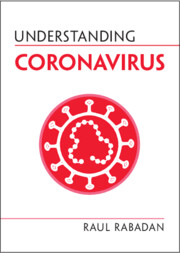Book contents
- Understanding Coronavirus
- Series page
- Understanding Coronavirus
- Copyright page
- Reviews
- Dedication
- Contents
- Foreword by Series Editor
- Preface
- Abbreviations
- 1 Introduction
- 2 How Is the Coronavirus Spreading?
- 3 What Is a Coronavirus?
- 4 How Is the Coronavirus Changing?
- 5 How Did the COVID-19 Outbreak Start and Evolve?
- 6 How Does the COVID-19 Outbreak Compare to the SARS Outbreak in 2003?
- 7 How Does the COVID-19 Outbreak Compare to Seasonal and Pandemic Influenza?
- 8 Are There Therapeutic Options?
- Conclusions
- Summary of Common Misunderstandings
- Updates at Press
- Suggested Further Reading
- Figure and Quotation Credits
- Index
1 - Introduction
Published online by Cambridge University Press: 02 June 2020
- Understanding Coronavirus
- Series page
- Understanding Coronavirus
- Copyright page
- Reviews
- Dedication
- Contents
- Foreword by Series Editor
- Preface
- Abbreviations
- 1 Introduction
- 2 How Is the Coronavirus Spreading?
- 3 What Is a Coronavirus?
- 4 How Is the Coronavirus Changing?
- 5 How Did the COVID-19 Outbreak Start and Evolve?
- 6 How Does the COVID-19 Outbreak Compare to the SARS Outbreak in 2003?
- 7 How Does the COVID-19 Outbreak Compare to Seasonal and Pandemic Influenza?
- 8 Are There Therapeutic Options?
- Conclusions
- Summary of Common Misunderstandings
- Updates at Press
- Suggested Further Reading
- Figure and Quotation Credits
- Index
Summary
At the end of December 2019, an outbreak of pneumonia cases of unknown origin was reported in Wuhan, Hubei province, China. The patients presented with high fever and had difficulty breathing. Most of these cases were related to the Huanan Seafood Wholesale Market, where, in addition to seafood, a variety of live animals were also sold. Other infections occurred in people staying at a nearby hotel on December 23–27. All tests carried out by the Chinese Center for Disease Control and Prevention for known viruses and bacteria were negative, indicating the presence of a previously unreported agent. A new virus was isolated and its genome sequenced, revealing a similarity with SARS-like coronaviruses found in bats. Although very similar to the virus causing severe acute respiratory syndrome (SARS) in 2003, it was different enough to be considered a new human-infecting coronavirus. Clusters of infected families, together with transmission in medical settings, indicated that the virus had the ability to undergo human-to-human transmission.
- Type
- Chapter
- Information
- Understanding Coronavirus , pp. 1 - 6Publisher: Cambridge University PressPrint publication year: 2020



